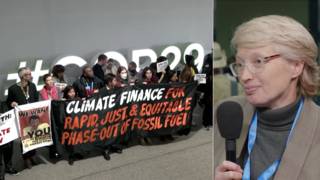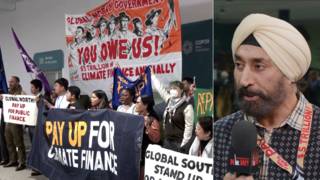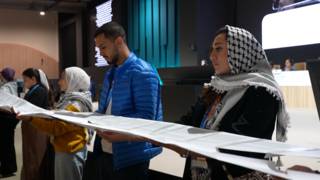
Related
The Obama administration’s authority to collect Americans’ phone records in bulk will likely expire next week after senators from both parties rejected attempts to extend it. First, the Republican-led Senate rejected a House-passed measure to curb bulk spying by keeping the records with phone companies instead of the government. The Senate then rejected a bid by Senate Majority Leader Mitch McConnell to extend the current bulk spying program for two months. The Senate adjourned and will reconvene May 31, the day before the program expires. In an exclusive interview from his place of refuge inside the Ecuadorean Embassy in London, WikiLeaks founder Julian Assange weighs in on the NSA standoff.
Transcript
AMY GOODMAN: We turn now to a Democracy Now! exclusive with WikiLeaks founder Julian Assange, who has spent nearly three years inside Ecuador’s Embassy in London, where he has political asylum. Assange faces investigations in both Sweden and the United States. Here in the U.S., a secret grand jury is investigating WikiLeaks for its role in publishing a trove of leaked documents about the Iraq and Afghanistan wars, as well as State Department cables. In Sweden, he’s wanted for questioning on allegations of sexual misconduct, though no charges have been filed. Earlier this month, Sweden’s Supreme Court rejected his appeal to lift his arrest warrant. Swedish prosecutors are reportedly preparing to travel to London to interview Assange after refusing to do so for years.
While Assange has been holed up inside the Ecuadorean Embassy, WikiLeaks has continued to publish documents, from leaked drafts of the TPP—that’s the Trans-Pacific Partnership—to the recent disclosures of the British nuclear submarine whistleblower William McNeilly, to secret details of a European Union plan to use military force to curb the influx of migrants from Libya. I spoke to Julian Assange about these issues and more when I sat down with him inside the embassy on Monday.
AMY GOODMAN: This is Democracy Now!, democracynow.org, The War and Peace Report. I’m Amy Goodman. We’re broadcasting inside the Ecuadorean Embassy in London. That’s right. Here is where Julian Assange has been holed up, granted political asylum by Ecuador, holed up here for almost three years. June 19th will mark the date that he came to this embassy in 2012.
Welcome to Democracy Now!, Julian. So it has been three years since you came here. How are you doing?
JULIAN ASSANGE: I’m not doing too badly, given the situation. And I think that’s really because I have something significant to focus on other than just my personal circumstance. That’s the same for all people who are in a situation of detainment. I’ve been five—almost five years now detained, in one form or another, without charge, here in the United Kingdom. I don’t live in the United Kingdom. I’m an Australian. So, it’s quite difficult for my family. But for me, WikiLeaks’ work and the various cases that we have, defensive and offensive, is enough to keep my mind out of the situation that I’m in. And that’s very important for detained people.
AMY GOODMAN: Which brings us to Edward Snowden, a man who you helped to secure his freedom, at least for now, though he’s not in the United States where he would like to be—he has political asylum in Russia—and what the revelations have led to—well, so many things all over the world, but in the United States, congressional action just in the last week, the challenges to the USA PATRIOT Act. Can you talk about what’s taken place? This is an absolutely critical week. June 1st, the USA PATRIOT Act, sections of it sunset unless they are continued. The administration has not appealed—applied for an automatic extension. And a number of senators, Republican and Democrat, have now bucked the corporate Republican-Democratic establishment and said they don’t want the overall surveillance of Americans. Explain more specifically what’s taken place.
JULIAN ASSANGE: The Edward Snowden revelations documented various forms of National Security Agency spying and secret interpretations of U.S. law that have been constructed by the Justice Department and the FISA courts. Now, some of those hinged on Section 215 of the USA PATRIOT Act, a secret interpretation, that has been found just this month to be unlawful in the U.S. Federal Court of Appeals.
Now, that has dovetailed with the electoral process in the United States, and so there’s now increasing push to be—increasing push for popularism. Rand Paul and Ron Wyden have tapped into that. The USA PATRIOT Act has been on rolling sunset clauses since 2001. The sunset clause is June the 1st, and so Ron Wyden and Rand Paul engaged in a filibuster, pushing the passage of the renewal of the PATRIOT Act off to a week where Congress had scheduled to be away all the way leading up to June 1st. So unless there’s an emergency recall of enough of the Senate and Congress, the sunset clause will hit, and that means there will have to be a new PATRIOT Act reintroduced. So it will have to be resuscitated as opposed to having a rollover, and that’s a more involved process. However, our sources say that the NSA is not too concerned, that it has secret interpretations of other authorities that give it much the same power that it would have had under the secret interpretation of 215 and other areas of the USA PATRIOT Act.
What Edward Snowden revealed about the secret interpretation of Section 215 of the PATRIOT Act was that the National Security Agency was using it to bulk-collect the calling records, every day, of essentially every American in the United States—the majority of the big telecommunications companies. However, that’s only a very small part of the National Security Agency’s mass interception system. On one hand, it can suck information out of the—of Google, Facebook and so on, under the PRISM system; and on the other hand, even more data is collected as a result of information flowing across the border of the United States or across borders of the United Kingdom, which has a sharing agreement with the National Security Agency.
But it is a type of at least political victory, showing that you can—Rand Paul clearly believes that you can garnish a type of political power by having a filibuster on this issue. I think that’s quite an important thing leading up to the 2016 presidential election. It’s safe now to have this as part of the political debate.
AMY GOODMAN: The administration has said, well, we’ll put the information in the control of the telecoms, the telephone companies, but that’s also something that Rand Paul has challenged: Why should the telecommunications companies, why should private enterprise have this information, holding it to be sought by the government?
JULIAN ASSANGE: That’s right. So the alternative proposal, which is something that was in the USA FREEDOM Act, which is pretty misnamed—it is a sort of milder version of the USA PATRIOT Act, in some ways. Instead, Verizon and the other—AT&T and other big telcos will hold the information, ready for the National Security Agency. But, you know, it doesn’t make much of a difference if that’s an automated system. It’s just—you know, 80 percent of the National Security Agency is outsourced anyway, in terms of the management of its data. In this case, if it has automatic connections to AT&T and Verizon, there’s no difference in terms of its searching ability. Now, in terms of whether there’s warrants that are used for searches, it is perhaps an aid, because the companies could be made legally liable—that’s up to Congress—for not insisting on a warrant to access that information. I rather suspect that Congress won’t mandate that the companies can’t hand over information unless there’s a warrant.
Now, it’s interesting to contrast that with the situation here in Europe. So, in Europe, there was legislation that telcos should hold that information for 18 months. Now, in Germany, that has been found—in fact, at the European Court level, has been found to be unconstitutional. And in Germany, it was ordered that all that information be flushed away. And now there’s a fight on with various European states, such as Sweden, insisting that they can retain the information, even though the laws of Europe say that they’re not permitted to retain that information.
AMY GOODMAN: Before we get to Germany and what you’ve revealed there, I want to stay with the U.S. for a minute, because President Obama famously said that the debate over privacy and surveillance would have been had without Edward Snowden. Can you respond to that?
JULIAN ASSANGE: Oh, I think it’s obvious to everyone that that is false. How can you have a debate with secret interpretations of the law? How can you debate them? They’re secret. Similarly, what are the actual actions that are occurring, not just in policy, but what is actually happening? What are these bureaucracies actually doing? If you don’t know, how can you possibly have the debate? Information is classified, no debate is possible.
AMY GOODMAN: WikiLeaks founder Julian Assange, speaking inside the Ecuadorean Embassy in London. If he steps foot outside, he will be arrested by British authorities. We’ll return to our interview with him in a minute and talk about the Trans-Pacific Partnership, as well as British nuclear submarine whistleblower William McNeilly. Stay with us.












Media Options